Motor vehicle
| Toyota Sienna | |
|---|---|
 2021 Toyota Sienna XLE (AXLH40) 2021 Toyota Sienna XLE (AXLH40) | |
| Overview | |
| Manufacturer | Toyota |
| Also called | Toyota Granvia (China, 2022–present) |
| Production | August 1997 – present |
| Model years | 1998–present |
| Body and chassis | |
| Class | Minivan |
| Body style | 5-door minivan |
| Chronology | |
| Predecessor |
|
The Toyota Sienna is a minivan manufactured and marketed by Toyota primarily for the North American market. It is named for the Italian city of Siena, in the region of Tuscany. It replaced the first generation Previa van in 1997 with a more conventional front-wheel drive layout and shares a heavily revised platform with the Camry. Both the Previa and original Sienna were smaller than the other minivans they competed against, but a redesign in 2003 (for the 2004 model year) increased the dimensions to match those of its competitors.
It was redesigned again in 2010 (for the 2011 model year). The third generation Sienna went on sale in the United States in February 2010 and is the first Sienna to ever receive a "Top Safety Pick" award from the Insurance Institute for Highway Safety. A 2020 redesign (for the 2021 model year) saw the Sienna becoming a hybrid vehicle for its fourth generation. While previous generations of the Sienna were exported to select Asian and European markets, the fourth generation is the first to be produced outside of the United States as Chinese production commenced in July 2021 by two Toyota joint ventures. In China, it is also marketed as the Toyota Granvia.
Following the discontinuation of General Motors's all-wheel drive minivans in 2006, the Sienna was the only minivan in its class offered with AWD in North America until the 2021 Chrysler Pacifica was introduced with an AWD option in 2020.
The Sienna is not available in Japan and Australia as it is not produced in a right-hand drive configuration, and the segment in these countries is already occupied by the Alphard/Vellfire and the HiAce/Granvia respectively.
As of the fourth generation, introduced in 2020, the Sienna is now built on Toyota's TNGA-K platform, which it shares with most of Toyota’s other large MPVs and crossovers.
First generation (XL10; 1997)
Motor vehicle| First generation | |
|---|---|
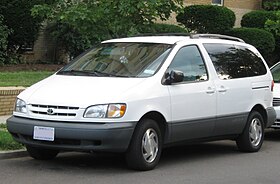 | |
| Overview | |
| Model code | XL10 |
| Production | August 1997 – December 2002 |
| Model years | 1998–2003 |
| Assembly | United States: Georgetown, Kentucky (TMMK) |
| Designer | Hosoda Ikuei, Yamaji Shinichi, Mitsunori Miyazaki, Hiroaki Shibata and Hiroaki Suzuki (1994) |
| Body and chassis | |
| Layout | Front-engine, front-wheel-drive |
| Related | |
| Powertrain | |
| Engine | |
| Power output | 194–210 hp (145–157 kW; 197–213 PS) |
| Transmission | 4-speed A540E/A541E automatic |
| Dimensions | |
| Wheelbase | 2,900 mm (114.2 in) |
| Length |
|
| Width | 1,860 mm (73.4 in) |
| Height | 1,710 mm (67.3 in) |
| Curb weight | 1,802 kg (3,973 lb) |
In 1997, Toyota launched the front-wheel drive 1998 model year Sienna in the North American market as a replacement for the mid-engined, rear-wheel-drive Previa. The Sienna debuted with a 3.0-liter 1MZ-FE V6 engine rated at 194 hp (145 kW) and 209 lb⋅ft (284 N⋅m) of torque. Built on an extended platform of the XV20 Toyota Camry, the Sienna was appropriately marketed as the "Camry of minivans," capitalizing on the Camry's popularity and reputation.
It came in three trim levels: CE, LE, and XLE. The LE and XLE models were equipped with second row captain's chairs while the CE models came equipped with a two-passenger bench seat in the second row. The seats may be folded and individually removed as needed. The driver side sliding door and roof rack were standard on the LE and XLE models, but were optional on the CE models. The XLE models offered leather seats and a wood trim package. The Sienna also touted best-in-class fuel economy of 16 mpg‑US (15 L/100 km; 19 mpg‑imp) city driving and 22 mpg‑US (11 L/100 km; 26 mpg‑imp) highway driving. It was built in Georgetown, Kentucky. A year after its release, the Sienna faced new competition from the redesigned Honda Odyssey minivan, which was larger and now offered a V6 like the Sienna.
This generation was noteworthy for its impressive safety content as one of the few minivans at the time to offer options including front seat-mounted side torso airbags and Vehicle Stability Control. Anti-lock braking was standard. The Insurance Institute for Highway Safety rated the Sienna "Good" in all six frontal crash test measures, which was far better than the Previa.
The reputation of this generation was marred by a class-action settlement for an engine oil sludge problem which affected the V6 engines in many Toyota models. Symptoms of the problem include oil smoke in the exhaust, oil quickly becoming dark or black after an oil change, gasoline odor in the oil, high oil consumption, and eventually engine failure.
-
 Toyota Sienna LE (pre-facelift)
Toyota Sienna LE (pre-facelift)
-
 Toyota Sienna LE (facelift)
Toyota Sienna LE (facelift)
-
 Toyota Sienna LE (facelift)
Toyota Sienna LE (facelift)
-
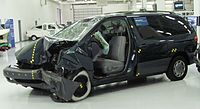 The 1998 Sienna crash-tested by the Insurance Institute for Highway Safety
The 1998 Sienna crash-tested by the Insurance Institute for Highway Safety
Safety
| Frontal Driver: | |
| Frontal Passenger: | |
| Side Driver: | |
| Side Rear Passenger: |
Model year changes
- 2000 (for the 2001 model year): The Sienna underwent a facelift to both front and rear fascias adding a redesigned front grille and bumper. The facelift also included redesigned tail lights sporting a more modern appearance (with clear-lens turn signals as opposed to amber-colored) as well as a change in the look of the speedometer. Toyota also revamped the center console area to add more usability to the HVAC controls along with new locations for the accessory switches (rear vent, power sliding doors, and heated seats). The engine also came equipped with a variable valve timing feature VVT-i boosting output to 210 hp (157 kW) and 220 lb⋅ft (298 N⋅m). The driver side sliding door became standard on all models, although the roof rack remained optional on the CE models.
Second generation (XL20; 2003)
Motor vehicle| Second generation | |
|---|---|
 Toyota Sienna (pre-facelift) Toyota Sienna (pre-facelift) | |
| Overview | |
| Model code | XL20 |
| Production | January 2003 – December 2009 |
| Model years | 2004–2010 |
| Assembly | United States: Princeton, Indiana (TMMI) |
| Designer | Kevin Hunter (2000) |
| Body and chassis | |
| Layout | |
| Platform | Toyota K platform |
| Related | |
| Powertrain | |
| Engine | |
| Power output |
|
| Transmission |
|
| Dimensions | |
| Wheelbase | 3,030 mm (119.3 in) |
| Length |
|
| Width | 1,970 mm (77.4 in) |
| Height | 1,750 mm (68.9 in) |
| Curb weight |
|
On 6 January 2003, the second-generation Sienna was unveiled at the North American International Auto Show in Detroit. Production was moved from the Georgetown plant to Toyota Motor Manufacturing Indiana.
Toyota assigned Yuji Yokoya as chief engineer on the new Sienna project. Yokoya and his family drove the previous model over 53,000 miles (85,000 km) throughout North America to find weaknesses from the design.
Changes from the first generation included 45% more volume overall and 39% more cargo space. The seats were in the 60/40 split configuration, and the flat-folding third row seat was offered even with all-wheel-drive. The engine was an updated ULEV certified 3.3-liter 3MZ-FE V6 paired with a new five-speed automatic transmission. The gear stick was moved from the steering column to the center console and had a gated shift pattern. Seating for eight was optional on lower-level trims, and the third row seating was fold-flat, allowing the van to transport 4 by 8 feet (1.2 by 2.4 m) building materials like plywood and drywall sheets.
Trim levels, in order of increasing standard and available features were: CE, LE, XLE and XLE Limited (renamed Limited in later years). The most distinguishable difference on the XLE Limited model was the horizontal chrome bar placed above the rear license plate. The CE had a black trim there, while the LE and XLE had a body-colored trim.
Standard features included remote keyless entry, tilt-and-telescopic steering wheel, and high solar energy-absorbing glass (HSEA) on the windshield and front windows. All 2004–2007 Siennas had a factory tow package (hitch kit and trailer lighting connections not included) and a 3,500 pounds (1,600 kg) towing capacity.
All-wheel drive, optional on the more expensive trims included run-flat tires. The all-wheel drive system continuously divided engine power 50:50 front and rear.
Options, depending on the trim level, included HID Xenon headlamps, Dynamic Laser Cruise Control, parking sensors, a convex rear view mirror to enable the driver to see the passengers, a voice-activated navigation system (not voice activated for the 2004/2005 model year) which included a backup camera, 10-speaker JBL audio and rear-seat DVD entertainment system with two 110 V outlets.
Updated styling allowed for a drag coefficient of Cd=0.30. EPA Fuel economy was 17 mpg city driving and 23 mpg highway for the FWD version. The AWD version got 16 mpg city driving and 22 mpg highway driving. The turning radius was 11.2 metres (37 ft).
Safety
The Sienna came standard with anti-lock braking system, brake assist, electronic brakeforce distribution, traction control and a tire-pressure monitoring system. Side torso airbags and side curtain airbags were standard on certain 2004 and 2005 LE and XLE trims while optional on others, but became standard on all 2006 trims. Vehicle Stability Control initially optional on lower trims became standard for 2008 models.
The IIHS gives the Sienna an overall "Good" score in their frontal offset crash test with "Good" marks in all six measured categories. All 2006 models and later receive a "Good" overall score, while pre-2006 models without side airbags receive an "Acceptable" score for side impacts.
| Frontal Driver: | |
| Frontal Passenger: | |
| Side Driver: | |
| Side Rear Passenger: | |
| 2WD Rollover: |
| Frontal Driver: | |
| Frontal Passenger: | |
| Side Driver: | |
| Side Rear Passenger: | |
| 2wd Rollover: |
Model year changes
 Toyota Sienna CE (facelift)
Toyota Sienna CE (facelift) Toyota Sienna LE (facelift)
Toyota Sienna LE (facelift)
- 2006: the front fascia, side molding, headlamps and tail lights were restyled. Blue-backlit electroluminescent Optitron gauges were added to LE, XLE, and Limited trims. The "XLE" prefix in "XLE Limited" was removed, and new exclusive equipment for this trim included an optional memory function for the driver's power seat and side-view mirrors (also available on XLE as an option) and power-folding exterior side-view mirrors with integrated in-glass LED turn-signal repeaters. Other options included Bluetooth and a power-folding third-row seat. Front row side torso airbags and side curtain airbags for all three rows became standard equipment on all models. The optional rear seat audio system was discontinued. Horsepower and torque ratings were changed to meet SAE's new standard to 215 hp (160 kW) and 222 lb·ft (from 230 hp (172 kW) and 242 lb⋅ft (328 N⋅m), Toyota also now rates engines on 87 octane).
- 2007: a new ULEV-II certified 3.5-liter 2GR-FE V6 engine rated at 266 hp (198 kW) with a rated fuel economy of 17/23 MPG for front-wheel-drive models and 16/21 MPG for AWD models replaced the 3.3-liter V6. This engine had a lower-maintenance timing chain as opposed to the timing belt of previous Sienna engines. The tire pressure monitor was upgraded, and a new seven-spoke alloy wheel design was made exclusive to the Limited and AWD models.
- 2008: Vehicle Stability Control became standard in all trims.
- 2009: the Sienna remained largely unchanged, except for a revision in pricing to become more competitive through several available comprehensively equipped "extra-value package" offerings. In Canada, base prices were lowered by up to $1,500. Rear power window switches were also modified to comply with new regulations against toggle window switches.
- 2010: the second generation Sienna was unchanged in its final model year.
Third generation (XL30; 2010)
Motor vehicle| Third generation | |
|---|---|
 Toyota Sienna XLE (pre-facelift) Toyota Sienna XLE (pre-facelift) | |
| Overview | |
| Model code | XL30 |
| Production | January 2010 – August 2020 |
| Model years | 2011–2020 |
| Assembly | United States: Princeton, Indiana (TMMI) |
| Designer | Ian Cartabiano and Kazuo Mori (2006) |
| Body and chassis | |
| Layout | |
| Platform | Toyota K platform |
| Related | |
| Powertrain | |
| Engine | |
| Power output |
|
| Transmission |
|
| Dimensions | |
| Wheelbase | 3,030 mm (119.3 in) |
| Length | 5,090 mm (200.2 in) |
| Width | 1,990 mm (78.2 in) |
| Height |
|
| Curb weight | 1,950 kg (4,310 lb) |
The redesigned Sienna premiered at the Los Angeles Auto Show in early December 2009 for the 2011 model year. It was designed at Calty studios and engineered at Toyota Technical Center in Ann Arbor, Michigan and Toyota Motor Corporation in Japan. The new Sienna arrived at dealers in February 2010. In November 2011, exports of the XL30 Sienna to South Korea began, making it the first Toyota minivan sold in the country. In July 2016, the Sienna was officially introduced to the Taiwanese market.
In the U.S., the third-generation Sienna was offered in five trim levels, a base grade, LE, XLE, Limited and for the first time the SE trim. The new SE offers revised bodywork, clear tail lamps, 19-inch (480 mm) wheels, firmer suspension and revised steering tuning for a sportier ride. All-wheel-drive is only available with the V6 engine on the LE, XLE and Limited model trims. Described by AOL Autos as slipping a sports car in a minivan, chief engineer Kazuo Mori (an avid autocrosser) reportedly had to overcome opposition to get the SE equipment package included in the line-up.
The previous 3.5-liter 2GR-FE continues, now coupled to a six-speed transmission, but for the first time the Sienna offers a four-cylinder engine, the 1AR-FE. This is the first time Toyota has offered a four-cylinder engine in a North American minivan since discontinuation of the Estima/Previa in late 1997. An electric power steering (EPS) system replaces the previous hydraulic power steering system. Toyota continued to offer all-wheel drive in the Sienna. As GM discontinued its AWD minivans after the 2006 model year, it was the only North American minivan with an available AWD drivetrain until the 2021 Chrysler Pacifica went on sale in late 2020. Toyota published EPA-estimated mileage figures of 19 mpg‑US (12.4 L/100 km) city / 24 mpg‑US (9.8 L/100 km) highway for models powered by the 4-cylinder engine, 18 mpg‑US (13.1 L/100 km) city / 24 mpg‑US (9.8 L/100 km) highway for 2WD V6 models, and 16 mpg‑US (14.7 L/100 km) city / 22 mpg‑US (10.7 L/100 km) highway for AWD models. An optional tow package for V6 models is rated to tow 3,500 pounds (1,600 kg).
The front dashboard features a "swoop" wood trim, inspired by the Toyota Venza and Lexus RX, that gives front seat occupants a "60/60" split whether in the driver or passenger seat.
New features included an optional sliding second row with "Lounge Seating" recliner style chairs, a feature previously seen on the Lexus LS, and Toyota's keyless Smart Key System with push-button start. The rear seat entertainment option now uses a 16.4-inch (41.7 cm) LCD screen which operates in two view modes, a single 16:9-ratio widescreen or two separate 4:3-ratio split screens with separate wireless headphones.
For safety the back-up camera comes with a new 180° panoramic view. Other new options include a Pre-Collision System (PCS) as well as an automatic highbeam dimmer, Safety Connect and a more advanced stability control system known as Vehicle Integrated Dynamics Management. A driver's knee airbag is now standard as well.
When the second row seats are removed, the bottom of the second row seats, which is similar to a rack, remains attached to the van floor. This means that with second row seats removed, the floor is not flat.
Toyota is the first automaker to offer a factory installed auto-access seat for disabled people. The one-touch rotating, power ascending/descending lift-up seat can lower to within 19 inches (48 cm) of the ground.
-
 Toyota Sienna XLE (pre-facelift)
Toyota Sienna XLE (pre-facelift)
-
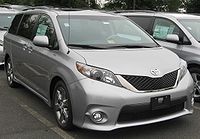 Toyota Sienna SE (pre-facelift)
Toyota Sienna SE (pre-facelift)
-
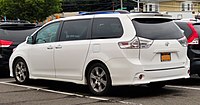 Toyota Sienna SE (pre-facelift)
Toyota Sienna SE (pre-facelift)
-
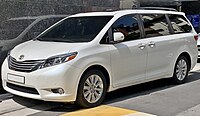 Toyota Sienna Limited (pre-facelift)
Toyota Sienna Limited (pre-facelift)
-
 2019 Toyota Sienna XLE (facelift)
2019 Toyota Sienna XLE (facelift)
-
 2020 Toyota Sienna LE (facelift)
2020 Toyota Sienna LE (facelift)
Yearly changes
- 2011, for the 2012 model year: Toyota's new navigation system with Entune connected navigation system became available.
- 2012, for the 2013 model year: The four-cylinder engine was dropped.
- 2013, for the 2014 model year: The Sienna remained unchanged.
- 2014, for the 2015 model year: Minor refresh with new tail lights for all trim levels except the SE. In the interior, the dash was redesigned replacing the asymmetric swoop with a more conventional and cohesive center display. The previous small info window on top of the dash was also removed and placed in the center display. The center console was also redesigned. The entertainment system was updated to Blu-Ray with HDMI and SD card auxiliary input, from the earlier DVD with RCA jacks. Several technological upgrades could be optioned. Toyota added three new colors (Sky Blue Pearl, Creme Brulee Metallic, and Attitude Black Metallic). For the Limited and SE models, the Sienna features refreshed headlights with LED daytime running lights.
- 2016, for the 2017 model year: The six-speed automatic transmission was replaced with an eight-speed and a revised 2GR-FKS engine adding Toyota's D4-S direct injection fuel system. The new engine increased power to 296 hp (221 kW), with torque increased to 263 lb⋅ft (357 N⋅m).
- 2017, for the 2018 model year: A mild facelift with a new front grille, new headlights, new side skirts, standard Safety Sense, minor noise and vibration enhancements, and additional technology like extra USB ports, an updated rear entertainment system (for models equipped with this option), and a semi-digital instrument cluster. The new grille is available in 3 styles: On the XLE and Limited, a chrome pair of wings bisects the grille. On the LE, the wing is black. The SE grille has no wing. The 2018 model year has standard automatic emergency braking, adaptive cruise control, lane-departure warning with lane-keeping assist, and automated high-beams.
- 2018, for the 2019 model year: All-wheel drive became available on the SE trim and the Limited trim with FWD is no longer offered. CarPlay support is introduced alongside the Entune 3.0 media system.
- 2019, for the 2020 model year: The Nightshade Edition became available on all FWD and AWD models. The Nightshade package includes four exterior colors: Midnight Black Metallic, Celestial Silver Metallic, Salsa Red Pearl and Super White.
Safety
| Driver small overlap frontal offset (2015–2020 models) | Acceptable |
| Passenger small overlap frontal offset | Marginal |
| Moderate overlap frontal offset | Good |
| Side impact | Good |
| Roof strength | Good |
- vehicle structure rated 'Marginal'
- vehicle structure rated 'Poor'
Fourth generation (XL40; 2020)
Motor vehicle| Fourth generation | |
|---|---|
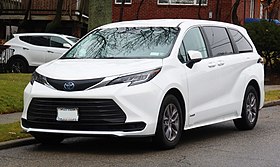 2021 Toyota Sienna LE (AXLH40) 2021 Toyota Sienna LE (AXLH40) | |
| Overview | |
| Model code | XL40 |
| Also called |
|
| Production |
|
| Model years | 2021–present |
| Assembly |
|
| Designer | Chao Feng |
| Body and chassis | |
| Layout |
|
| Platform | TNGA: GA-K |
| Related | |
| Powertrain | |
| Engine | |
| Electric motor | 2x permanent-magnet synchronous motor (PMSM) |
| Power output | 186 hp (139 kW; 189 PS) (gasoline engine only); 243 hp (181 kW; 246 PS) (combined system output) |
| Transmission | eCVT |
| Hybrid drivetrain | Power-split (Hybrid Synergy Drive) |
| Battery | 1.9 kWh (HEV) |
| Plug-in charging | V2L: 1.5 kW (HEV) |
| Dimensions | |
| Wheelbase | 3,060 mm (120.5 in) |
| Length | 5,170–5,180 mm (203.7–204.1 in) |
| Width | 1,990 mm (78.5 in) |
| Height | 1,740–1,780 mm (68.5–70 in) |
Toyota announced the fourth-generation Sienna in May 2020 as a 2021 model, and appearing for sale near the end of 2020. It was originally intended to be revealed at the 2020 New York International Auto Show in April, but instead was unveiled virtually on 18 May 2020 due to the COVID-19 pandemic. It was released on 27 October 2020 and hit the showrooms shortly after in November. It is built on GA-K platform. In a significant change, all grades of the Sienna came standard with a hybrid powertrain. Despite being hybrid only, Toyota claims that the fourth-generation Sienna can still tow the same 1,600 kg (3,500 lb) capacity as the third-generation model.
The fourth-generation Sienna is offered in the returning LE, XLE and Limited trims, while receiving two additional trims: the sport-oriented XSE (replaced the SE trim), and the top-of-the-line Platinum trim. The Sienna is available with a built-in vacuum cleaner, refrigerated compartment (however, vacuum and refrigerator were later discontinued due to supplier issues), heads-up display, and 360° camera view on the Platinum trim level. In addition, the Sienna can be equipped with a third electric motor to power the rear wheels. Standard and optional family oriented features for the Sienna include 18 cup holders, 7 USB ports (only one of which is data capable), four-zone climate control, onboard Wi-Fi, rear entertainment system, power sliding doors and liftgate, and a voice amplification system for the driver for better communications with passengers seated in the back. Standard driver-assistance features include adaptive cruise control, blind-spot monitoring, automated emergency braking, and lane-keeping assist.
Starting in early 2021, the Sienna became available in Taiwan and in Mexico. In July 2021, the Sienna was launched in China where it is locally produced by GAC Toyota, while a rebadged variant bearing the Toyota Granvia (Chinese: 格瑞维亚; pinyin: Géruìwéiyǎ) nameplate was produced by FAW Toyota. The Granvia adopted the styling of the North American Sienna XSE.
-
 2021 Toyota Sienna XLE (AXLH40)
2021 Toyota Sienna XLE (AXLH40)
-
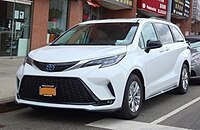 2022 Toyota Sienna XSE (AXLH40)
2022 Toyota Sienna XSE (AXLH40)
-
 2021 Toyota Sienna Limited (AXLH40)
2021 Toyota Sienna Limited (AXLH40)
-
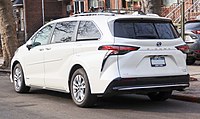 2021 Toyota Sienna Limited (AXLH40)
2021 Toyota Sienna Limited (AXLH40)
Yearly changes
- 2021, for the 2022 model year: The Woodland Edition was launched, with standard AWD, raised suspension, and tow package. It is built on the XLE trim.
- 2022, for the 2023 model year: The Sienna 25th Anniversary was introduced as a limited model with 2,525 units produced, featuring exclusive exterior and interior trim. It is based on the XSE trim.
Safety
| Driver small overlap frontal offset | Good |
| Passenger small overlap frontal offset | Good |
| Moderate overlap frontal offset: original test | Good |
| Moderate overlap frontal offset: updated test (2023 models) | Marginal |
| Side impact: original test | Good |
| Side impact: updated test (2021-2023 models) | Good |
| Roof strength | Good |
Sales
| Year | U.S. | Canada | Mexico | China |
|---|---|---|---|---|
| 1997 | 15,180 | |||
| 1998 | 81,391 | |||
| 1999 | 98,809 | |||
| 2000 | 103,137 | |||
| 2001 | 88,469 | |||
| 2002 | 80,915 | |||
| 2003 | 105,499 | |||
| 2004 | 159,119 | |||
| 2005 | 161,380 | 5,322 | 7,083 | |
| 2006 | 163,269 | 11,579 | 6,950 | |
| 2007 | 138,162 | 9,820 | 6,580 | |
| 2008 | 115,944 | 7,000 | 4,363 | |
| 2009 | 84,064 | 6,345 | 3,303 | |
| 2010 | 98,337 | 9,960 | 5,619 | |
| 2011 | 111,429 | 10,835 | 7,215 | |
| 2012 | 114,725 | 11,858 | 7,032 | |
| 2013 | 121,117 | 11,756 | 5,434 | |
| 2014 | 124,502 | 11,596 | 4,861 | |
| 2015 | 137,497 | 13,981 | 5,438 | |
| 2016 | 127,791 | 13,404 | 5,727 | |
| 2017 | 111,489 | 15,770 | 6,478 | |
| 2018 | 87,672 | 15,117 | 7,022 | |
| 2019 | 73,585 | 14,631 | 6,898 | |
| 2020 | 42,885 | 8,821 | 4,459 | |
| 2021 | 107,990 | 11,869 | 8,619 | 2,791 |
| 2022 | 69,751 | 5,507 | 74,381 | |
| 2023 | 66,539 | 3,710 | 76,575 |
Awards
2004:
- Car and Driver's Five Best Trucks Van Award
- Edmunds Editor's Most Wanted Van
- Edmunds Consumers' Most Wanted
2010:
- Best Resale Value Award
- Insurance Institute for Highway Safety's "Top Safety Pick" Award (2011 model year only)
2019:
- Longest-Kept Minivan
References
- ^ Williams, Mark (4 June 2003). "First Drive: 2004 Toyota Sienna". Motor Trend. Archived from the original on 29 June 2011. Retrieved 12 November 2009.
- Bartlett, Jeff (30 May 2003). "First Drive: 2004 Toyota Sienna XLE Limited". Motor Trend. Archived from the original on 10 November 2009. Retrieved 12 November 2009.
- "First Look: 2009 Toyota Sienna". Motor Trend. 8 October 2008. Archived from the original on 11 November 2009. Retrieved 12 November 2009.
- Hoffman, Connor (6 February 2020). "2021 Chrysler Pacifica Finally Gets an All-Wheel-Drive Model". Car and Driver. Retrieved 6 February 2020.
- Counts, Reese (27 October 2020). "Toyota Sienna Prices, Reviews, and Pictures". Edmunds.com. US. Retrieved 25 April 2021.
- "A look at Toyota's 25 years in Kentucky". KyForward. Lexington, Kentucky. Archived from the original on 12 November 2014.
- "Toyota's Sienna Minivan Leaving Georgetown Plant". Kentucky: Toyota. 19 December 2012. Archived from the original on 14 March 2016. Retrieved 29 June 2014.
- "j-platpat".
- "IIHS-HLDI: Toyota Sienna". Iihs.org. 2 September 2005. Archived from the original on 30 November 2008. Retrieved 12 December 2009.
- "Safercar.gov". Safercar.gov. Retrieved 12 December 2009.
- "Sienna Minivan Rolls Off Toyota's New Indiana Production Line". Automotive Intelligence News. 15 January 2003. Retrieved 29 June 2014.
- ^ "Toyota Stages World Premiere of All-New Sienna at NAIAS in Detroit" (Press release). PR Newswire. 6 January 2003. Retrieved 29 June 2014.
- Tilin, Andrew (1 January 2005). "The Smartest Company of the Year". CNN. Retrieved 12 November 2009.
- "2004 Toyota Sienna". Edmunds. Retrieved 9 January 2016.
- "Toyota Sienna Is Only Family Van To Offer All-Wheel Drive" (Press release). US: Toyota. 22 October 2007. Archived from the original on 21 June 2010. Retrieved 30 September 2010.
- "IIHS-HLDI: Toyota Sienna". Iihs.org. Archived from the original on 4 October 2009. Retrieved 12 December 2009.
- "Safercar.gov". Safercar.gov. Archived from the original on 17 September 2008. Retrieved 12 December 2009.
- "Safercar.gov". Safercar.gov. Archived from the original on 17 September 2008. Retrieved 24 February 2010.
- "2007 Toyota Sienna". Motor Trend. 2007. Archived from the original on 20 December 2009. Retrieved 12 November 2009.
- "TOYOTA CANADA INC. | The 2009 Toyota Sienna: The ultimate minivan for families on the go delivers greater value, quality and safety at a better price". Newswire.ca. Retrieved 12 December 2009.
- "2010 Toyota Sienna". Edmunds. Retrieved 9 January 2016.
- "Toyota Begins Production of Third-Generation Sienna at Indiana Plant" (Press release). US: Toyota. 20 January 2010. Retrieved 9 January 2024.
- Filipponio, Frank (18 December 2009). "First Drive: 2011 Toyota Sienna tries to make the minivan cool — Autoblog". Autoblog.com. Retrieved 18 March 2010.
- "Redesigned Toyota Sienna to Debut at L.A. Auto Show – KickingTires". Blogs.cars.com. Archived from the original on 15 December 2009. Retrieved 12 December 2009.
- Kim, Cynthia J. (6 November 2011). "U.S.-built Japan cars hit Korea for tax perks". The Korea Herald. Korea. Retrieved 28 August 2020.
- "TOYOTA Taiwan - Posts". Facebook (in Chinese). Retrieved 8 March 2023.
- ^ "2012 Toyota Sienna New Car Test Drive". Autoblog. Retrieved 5 December 2016.
- Alaniz, Anthony. "Toyota Sienna Review". Mojo Motors. Retrieved 10 March 2014.
- "2011 Toyota Sienna – First Drive". Insideline.com. 18 December 2009. Retrieved 18 March 2010.
- Sienna Owner makes this comment (4 June 2010). "First Drive: 2011 Toyota Sienna". Family Car Review. Archived from the original on 15 October 2010. Retrieved 5 October 2010.
- Lee, Dave (11 January 2010). "Toyota Debuts New Auto Access Seat for Third-Generation 2011 Sienna at North American International Auto Show" (Press release). US: Toyota. Retrieved 23 October 2013.
- "Toyota's Debut of 2017 Highlander Mid-Size SUV to Showcase Significant Performance Updates" (Press release). US: Toyota. 14 March 2016.
- Popely, Rick (5 August 2016). "2017 Toyota Sienna: What's Changed". Cars.com. Retrieved 31 August 2016.
- "Toyota Brings Swagger and Sportiness to New York International Auto Show With Debut of 2018 Sienna Van and Yaris Hatchback" (Press release). US: Toyota. 22 March 2017. Archived from the original on 3 April 2019. Retrieved 25 March 2017.
- "Safety First: 2018 Toyota Sienna Gains Standard Toyota Safety Sense P (TSS-P)" (Press release). US: Toyota. 3 November 2017. Retrieved 1 November 2020.
- Lorio, Joe (10 May 2017). "2017 Toyota Sienna FWD". Car and Driver. US. Retrieved 25 May 2019.
- "2020 Toyota Sienna - All-New Nightshade Edition Added". Toyota USA Newsroom. 24 May 2019. Retrieved 15 August 2022.
- "2015 Toyota Sienna". US: IIHS. Retrieved 23 November 2021.
- "Granvia来了 一汽丰田版赛那申报图曝光". autohome.com.cn. 14 March 2022. Retrieved 27 March 2022.
- Perez, Jeff. "2021 Toyota Sienna Debuts With Standard Hybrid Powertrain, Bold Looks". Motor1.com. Retrieved 18 May 2020.
- "2021 Toyota Sienna Hits Dealerships This November" (Press release). US: Toyota. 27 October 2020.
- "2021 Toyota Sienna hybrid minivan revealed with photos, specs, details". Autoblog. US. 18 May 2020. Retrieved 19 May 2020.
- "Toyota Launches All-New 2021 Sienna to Suit a Variety of Lifestyles" (Press release). US: Toyota. 18 May 2020.
- Capparella, Joey (18 May 2020). "2021 Toyota Sienna Looks Wild and Comes Only as a Hybrid". Car and Driver. US. Retrieved 19 May 2020.
- "和製子彈列車駕到!2021 Toyota大改款Sienna媒體預賞暨開放接單預售早鳥價210萬起! - Yahoo奇摩汽車機車" [And the bullet train is here! 2021 Toyota facelifted Sienna media preview and open order pre-sale early bird price starting at 2.1 million!]. Yahoo (in Chinese (Taiwan)). 25 November 2020. Retrieved 22 May 2021.
- García, Gerardo (28 January 2021). "La Toyota Sienna 2021 ya tiene precio en México: híbrida en todas sus versiones". Motorpasión México (in Mexican Spanish). Retrieved 19 July 2021.
- "丰田Sienna正式引入国产化,不是"塞纳"而是"赛那"" [Toyota Sienna officially introduced localization, not "Senna" but "Sina"]. Sohu (in Chinese (China)). 6 July 2021. Retrieved 26 August 2021.
- "Toyota Marks 25th Anniversary of Sienna with Special Limited Edition" (Press release). US: Toyota. 19 May 2022. Retrieved 27 May 2022.
- "2023 Toyota Sienna". US: IIHS. Retrieved 6 October 2023.
- Demandt, Bart (20 November 2015). "Toyota Sienna US car sales figures". carsalesbase.com. Retrieved 11 October 2022.
- "Toyota Sienna Canada Sales Figures". CarFigures. Retrieved 18 April 2024.
- ^ "Toyota Sienna Sales Figures". GCBC. Retrieved 11 October 2022.
- "Venta al público y producción de vehículos ligeros por marca, modelo, segmento y país origen". Instituto Nacional de Estadística, Geografía e Informática (INEGI) (in Mexican Spanish). Retrieved 4 November 2021.
- "Toyota Sets Sales Record for Sixth Year in a Row". Theautochannel.com. 3 January 2002. Retrieved 12 December 2009.
- "Toyota Announces Best Sales Year in Its 46-Year History, Breaks Sales Record for Eighth Year in a Row". Theautochannel.com. 5 January 2004. Retrieved 12 December 2009.
- "Toyota Reports 2005 and December Sales". Theautochannel.com. 4 January 2006. Retrieved 12 December 2009.
- "Toyota Reports 2007 and December Sales". Theautochannel.com. 3 January 2008. Retrieved 12 December 2009.
- ^ "Toyota | Toyota Reports December 2011 and Year-End Sales" (Press release). US: Toyota. 4 January 2012. Archived from the original on 1 August 2013. Retrieved 24 April 2012.
- "December 2012 and Year-End Sales Chart" (Press release). US: Toyota. 3 January 2013. Archived from the original on 6 January 2013. Retrieved 4 January 2013.
- "December 2013 and Year-End Sales Chart" (Press release). US: Toyota. 3 January 2014. Archived from the original on 8 January 2014. Retrieved 9 January 2014.
- "December 2014 and Year-End Sales Chart" (Press release). US: Toyota. 5 January 2015. Archived from the original on 7 January 2015. Retrieved 6 January 2015.
- "December 2015 and Year-End Sales Chart" (Press release). US: Toyota. 5 January 2016. Archived from the original on 18 January 2016. Retrieved 18 January 2016.
- "December 2016 and Year-End Sales Chart" (Press release). US: Toyota. 5 January 2017. Retrieved 5 January 2017.
- "December 2017 Sales Chart" (Press release). US: Toyota. 3 January 2018. Archived from the original on 18 July 2018. Retrieved 9 February 2019.
- "December 2018 Sales Chart" (Press release). US: Toyota. 3 January 2018. Archived from the original on 30 January 2019. Retrieved 30 January 2019.
- "Toyota Sienna Sales Figures". US: Good Car Bad Car. Retrieved 14 January 2020.
- "Toyota Motor North America Reports December 2020, Year-End Sales" (Press release). USA: Toyota. 5 January 2021.
- "Toyota Motor North America Reports U.S. December, Year-End 2021 Sales" (Press release). USA: Toyota. 4 January 2022.
- García, Gerardo (8 January 2022). "Los 379 autos más vendidos de México en 2021: la lista completa del ranking de ventas". Motorpasión México (in Spanish). Retrieved 18 April 2024.
- "Toyota Motor North America Reports Year-End 2022 U.S. Sales Results" (Press release). USA: Toyota. 4 January 2023.
- García, Gerardo (6 January 2023). "Los 371 autos más vendidos de México en 2022: el ranking completo con todos los modelos". Motorpasión México (in Spanish). Retrieved 18 April 2024.
- "Toyota Motor North America Reports Year-End 2023 U.S. Sales Results" (Press release). USA: Toyota. 3 January 2024.
- García, Gerardo (10 January 2024). "Los autos más vendidos en México en 2023: así queda el ranking con los 389 modelos". Motorpasión México (in Spanish). Retrieved 18 April 2024.
- "【易车销量榜】全国2023年丰田零售量销量榜-易车榜-易车". car.yiche.com (in Chinese). Retrieved 18 April 2024.
- "2004 Editors' Most Wanted Awards". Edmunds. US. 2004. Retrieved 9 February 2019.
- "Consumers' Most Wanted - 2004". Edmunds. US. 2004. Archived from the original on 2 June 2005. Retrieved 9 February 2019.
- "2015 Best Resale Value Awards – Kelley Blue Book". Kbb.com. 1 January 2015. Archived from the original on 30 May 2015. Retrieved 29 May 2015.
- Blackley, Julie (2019). "Cars Original Owners Keep for 15 Years or Longer". iSeeCars. US. Retrieved 9 February 2019.
External links
| Toyota road minivan/van timeline, international markets, 1985–present | |||||||||||||||||||||||||||||||||||||||||||||||||||||||||||||||||||||||||||||||||||||||||||||||||||||||||||||||||||||||||||||||||||||||||||||||||||||||||||||||||||||||||||||||||||||||||||||||||||||||||||||||||||||||||||||||||||||||||||||||||||||||||||||||||||||||||||||||||||||||||||||||||||||||||||||||||||||||||||||||||||||||||||||||||||||||||||||||||||||||||||||||||||||||||||||||||||||||||||||||||||||||||||||||||||||||||||||||||||||||||||||||||||||||||||||||||||||||||||||||||||||||||||||||||||||||||||||||||||||||||||||||||||||||||||||||||||||||||||||||||||||||||||||||||||||||||||||||||||||||||||||||||||||||||||||||||||||||||||||||||||||||||||||||||||||||||||||||||||||||||||||||||||||||||||||||||||||||||||||||||||||||||||||||||||||||||||||||||||||||||||||||||||||||||||||||||||||||||||||||||||||||||||||||||||||||||||||||||||||||||||||||||||||||||||||||||||||||||||||||||||||||||||||||||||||||||||||||||||||||||||||||||||||||||||||||||||||||||||||||||||||||||||||||||||||||||||||||||||||||
|---|---|---|---|---|---|---|---|---|---|---|---|---|---|---|---|---|---|---|---|---|---|---|---|---|---|---|---|---|---|---|---|---|---|---|---|---|---|---|---|---|---|---|---|---|---|---|---|---|---|---|---|---|---|---|---|---|---|---|---|---|---|---|---|---|---|---|---|---|---|---|---|---|---|---|---|---|---|---|---|---|---|---|---|---|---|---|---|---|---|---|---|---|---|---|---|---|---|---|---|---|---|---|---|---|---|---|---|---|---|---|---|---|---|---|---|---|---|---|---|---|---|---|---|---|---|---|---|---|---|---|---|---|---|---|---|---|---|---|---|---|---|---|---|---|---|---|---|---|---|---|---|---|---|---|---|---|---|---|---|---|---|---|---|---|---|---|---|---|---|---|---|---|---|---|---|---|---|---|---|---|---|---|---|---|---|---|---|---|---|---|---|---|---|---|---|---|---|---|---|---|---|---|---|---|---|---|---|---|---|---|---|---|---|---|---|---|---|---|---|---|---|---|---|---|---|---|---|---|---|---|---|---|---|---|---|---|---|---|---|---|---|---|---|---|---|---|---|---|---|---|---|---|---|---|---|---|---|---|---|---|---|---|---|---|---|---|---|---|---|---|---|---|---|---|---|---|---|---|---|---|---|---|---|---|---|---|---|---|---|---|---|---|---|---|---|---|---|---|---|---|---|---|---|---|---|---|---|---|---|---|---|---|---|---|---|---|---|---|---|---|---|---|---|---|---|---|---|---|---|---|---|---|---|---|---|---|---|---|---|---|---|---|---|---|---|---|---|---|---|---|---|---|---|---|---|---|---|---|---|---|---|---|---|---|---|---|---|---|---|---|---|---|---|---|---|---|---|---|---|---|---|---|---|---|---|---|---|---|---|---|---|---|---|---|---|---|---|---|---|---|---|---|---|---|---|---|---|---|---|---|---|---|---|---|---|---|---|---|---|---|---|---|---|---|---|---|---|---|---|---|---|---|---|---|---|---|---|---|---|---|---|---|---|---|---|---|---|---|---|---|---|---|---|---|---|---|---|---|---|---|---|---|---|---|---|---|---|---|---|---|---|---|---|---|---|---|---|---|---|---|---|---|---|---|---|---|---|---|---|---|---|---|---|---|---|---|---|---|---|---|---|---|---|---|---|---|---|---|---|---|---|---|---|---|---|---|---|---|---|---|---|---|---|---|---|---|---|---|---|---|---|---|---|---|---|---|---|---|---|---|---|---|---|---|---|---|---|---|---|---|---|---|---|---|---|---|---|---|---|---|---|---|---|---|---|---|---|---|---|---|---|---|---|---|---|---|---|---|---|---|---|---|---|---|---|---|---|---|---|---|---|---|---|---|---|---|---|---|---|---|---|---|---|---|---|---|---|---|---|---|---|---|---|---|---|---|---|---|---|---|---|---|---|---|---|---|---|---|---|---|---|---|---|---|---|---|---|---|---|---|---|---|---|---|---|---|---|---|---|---|---|---|---|---|---|---|---|---|---|---|---|---|---|---|---|---|---|---|---|---|---|---|---|---|---|---|---|---|---|---|---|---|---|---|---|---|---|---|---|---|---|---|---|---|---|---|---|---|---|---|---|---|---|---|---|---|---|---|---|---|---|---|---|---|---|---|---|---|---|---|---|---|---|---|---|---|---|---|---|---|---|---|---|---|---|---|---|---|---|---|---|---|---|---|---|---|---|---|---|---|---|---|---|---|---|---|---|---|---|---|---|---|---|---|---|---|---|---|---|---|---|---|---|---|---|---|---|---|---|---|---|---|---|---|---|---|---|---|---|---|---|---|---|---|---|---|---|---|---|---|---|---|---|---|---|---|---|---|---|---|---|---|---|---|---|---|---|---|---|---|---|---|---|---|---|---|---|---|---|---|---|---|---|---|---|---|---|---|---|---|---|---|---|---|---|---|---|---|---|---|---|---|---|---|---|---|---|---|---|---|---|---|---|---|---|---|---|---|---|---|---|---|---|---|---|---|---|---|---|---|---|---|---|---|---|---|---|---|---|---|---|---|---|---|---|---|---|---|---|---|---|---|---|---|---|---|---|---|---|---|---|---|---|---|---|---|---|---|---|---|---|---|---|---|---|---|---|---|---|---|---|---|---|---|---|---|---|---|---|---|---|---|---|---|---|---|---|---|---|---|---|---|---|---|---|---|---|---|---|---|---|---|---|---|---|---|---|---|---|---|---|---|---|---|---|---|---|---|---|---|---|---|---|---|---|---|---|---|---|---|---|---|---|---|---|---|---|---|---|
| |||||||||||||||||||||||||||||||||||||||||||||||||||||||||||||||||||||||||||||||||||||||||||||||||||||||||||||||||||||||||||||||||||||||||||||||||||||||||||||||||||||||||||||||||||||||||||||||||||||||||||||||||||||||||||||||||||||||||||||||||||||||||||||||||||||||||||||||||||||||||||||||||||||||||||||||||||||||||||||||||||||||||||||||||||||||||||||||||||||||||||||||||||||||||||||||||||||||||||||||||||||||||||||||||||||||||||||||||||||||||||||||||||||||||||||||||||||||||||||||||||||||||||||||||||||||||||||||||||||||||||||||||||||||||||||||||||||||||||||||||||||||||||||||||||||||||||||||||||||||||||||||||||||||||||||||||||||||||||||||||||||||||||||||||||||||||||||||||||||||||||||||||||||||||||||||||||||||||||||||||||||||||||||||||||||||||||||||||||||||||||||||||||||||||||||||||||||||||||||||||||||||||||||||||||||||||||||||||||||||||||||||||||||||||||||||||||||||||||||||||||||||||||||||||||||||||||||||||||||||||||||||||||||||||||||||||||||||||||||||||||||||||||||||||||||||||||||||||||||||
| |||||||||||||||||||||||||||||||||||||||||||||||||||||||||||||||||||||||||||||||||||||||||||||||||||||||||||||||||||||||||||||||||||||||||||||||||||||||||||||||||||||||||||||||||||||||||||||||||||||||||||||||||||||||||||||||||||||||||||||||||||||||||||||||||||||||||||||||||||||||||||||||||||||||||||||||||||||||||||||||||||||||||||||||||||||||||||||||||||||||||||||||||||||||||||||||||||||||||||||||||||||||||||||||||||||||||||||||||||||||||||||||||||||||||||||||||||||||||||||||||||||||||||||||||||||||||||||||||||||||||||||||||||||||||||||||||||||||||||||||||||||||||||||||||||||||||||||||||||||||||||||||||||||||||||||||||||||||||||||||||||||||||||||||||||||||||||||||||||||||||||||||||||||||||||||||||||||||||||||||||||||||||||||||||||||||||||||||||||||||||||||||||||||||||||||||||||||||||||||||||||||||||||||||||||||||||||||||||||||||||||||||||||||||||||||||||||||||||||||||||||||||||||||||||||||||||||||||||||||||||||||||||||||||||||||||||||||||||||||||||||||||||||||||||||||||||||||||||||||||
| Toyota light truck timeline, North American market, 1980s–present (model years) | ||||||||||||||||||||||||||||||||||||||||||||||||||||||||||||||||||||||||||||||||||||||||||||||||||||||||||||||||||||||||||||||||||||||||||||||||||||||||||||||||||||||||||||||||||||||||||||||||||||||||||||||||||||||||||||||||||||||||||||||||||||||||||||||||||||||||||||||||||||||||||||||||||||||||||||||||||||||||||||||||||||||||||||||||||||||||||||||||||||||||||||||||||||||||||||||||||||||||||||||||||||||||||||||||||||||||||||||||||||||||||||||||||||||||||||||||||||||||||||||||||||||||||||||||||||||||||||||||||||||||||||||||||||||||||||||||||||||||||||||||||||||||||||||||||||||||||||||||||||||||||||||||||||||||||||||||||||||||||||||||||||||||||||||||||||||||||||||||||||||||||||||||||||||||||||||||||||||||||||||||||||||||||||||||||||||||||||||||||||||||||||||||||||||||||||||||||||||||
|---|---|---|---|---|---|---|---|---|---|---|---|---|---|---|---|---|---|---|---|---|---|---|---|---|---|---|---|---|---|---|---|---|---|---|---|---|---|---|---|---|---|---|---|---|---|---|---|---|---|---|---|---|---|---|---|---|---|---|---|---|---|---|---|---|---|---|---|---|---|---|---|---|---|---|---|---|---|---|---|---|---|---|---|---|---|---|---|---|---|---|---|---|---|---|---|---|---|---|---|---|---|---|---|---|---|---|---|---|---|---|---|---|---|---|---|---|---|---|---|---|---|---|---|---|---|---|---|---|---|---|---|---|---|---|---|---|---|---|---|---|---|---|---|---|---|---|---|---|---|---|---|---|---|---|---|---|---|---|---|---|---|---|---|---|---|---|---|---|---|---|---|---|---|---|---|---|---|---|---|---|---|---|---|---|---|---|---|---|---|---|---|---|---|---|---|---|---|---|---|---|---|---|---|---|---|---|---|---|---|---|---|---|---|---|---|---|---|---|---|---|---|---|---|---|---|---|---|---|---|---|---|---|---|---|---|---|---|---|---|---|---|---|---|---|---|---|---|---|---|---|---|---|---|---|---|---|---|---|---|---|---|---|---|---|---|---|---|---|---|---|---|---|---|---|---|---|---|---|---|---|---|---|---|---|---|---|---|---|---|---|---|---|---|---|---|---|---|---|---|---|---|---|---|---|---|---|---|---|---|---|---|---|---|---|---|---|---|---|---|---|---|---|---|---|---|---|---|---|---|---|---|---|---|---|---|---|---|---|---|---|---|---|---|---|---|---|---|---|---|---|---|---|---|---|---|---|---|---|---|---|---|---|---|---|---|---|---|---|---|---|---|---|---|---|---|---|---|---|---|---|---|---|---|---|---|---|---|---|---|---|---|---|---|---|---|---|---|---|---|---|---|---|---|---|---|---|---|---|---|---|---|---|---|---|---|---|---|---|---|---|---|---|---|---|---|---|---|---|---|---|---|---|---|---|---|---|---|---|---|---|---|---|---|---|---|---|---|---|---|---|---|---|---|---|---|---|---|---|---|---|---|---|---|---|---|---|---|---|---|---|---|---|---|---|---|---|---|---|---|---|---|---|---|---|---|---|---|---|---|---|---|---|---|---|---|---|---|---|---|---|---|---|---|---|---|---|---|---|---|---|---|---|---|---|---|---|---|---|---|---|---|---|---|---|---|---|---|---|---|---|---|---|---|---|---|---|---|---|---|---|---|---|---|---|---|---|---|---|---|---|---|---|---|---|---|---|---|---|---|---|---|---|---|---|---|---|---|---|---|---|---|---|---|---|---|---|---|---|---|---|---|---|---|---|---|---|---|---|---|---|---|---|---|---|---|---|---|---|---|---|---|---|---|---|---|---|---|---|---|---|---|---|---|---|---|---|---|---|---|---|---|---|---|---|---|---|---|---|---|---|---|---|---|---|---|---|---|---|---|---|---|---|---|---|---|---|---|---|---|---|---|---|---|---|---|---|---|---|---|---|---|---|---|---|---|---|---|---|---|---|---|---|---|---|---|---|---|---|---|---|---|---|---|---|---|---|---|---|---|---|---|---|---|---|---|---|---|---|---|---|---|---|---|---|---|---|---|---|---|---|---|---|---|---|---|---|---|---|---|---|---|---|---|---|---|---|---|---|---|---|---|---|---|---|---|---|---|---|---|---|---|---|---|---|---|---|---|---|---|---|---|---|---|---|---|---|---|---|---|---|---|---|---|---|---|---|---|---|---|---|---|---|---|---|---|---|---|---|---|---|---|---|---|---|---|---|---|---|---|---|---|---|
| ||||||||||||||||||||||||||||||||||||||||||||||||||||||||||||||||||||||||||||||||||||||||||||||||||||||||||||||||||||||||||||||||||||||||||||||||||||||||||||||||||||||||||||||||||||||||||||||||||||||||||||||||||||||||||||||||||||||||||||||||||||||||||||||||||||||||||||||||||||||||||||||||||||||||||||||||||||||||||||||||||||||||||||||||||||||||||||||||||||||||||||||||||||||||||||||||||||||||||||||||||||||||||||||||||||||||||||||||||||||||||||||||||||||||||||||||||||||||||||||||||||||||||||||||||||||||||||||||||||||||||||||||||||||||||||||||||||||||||||||||||||||||||||||||||||||||||||||||||||||||||||||||||||||||||||||||||||||||||||||||||||||||||||||||||||||||||||||||||||||||||||||||||||||||||||||||||||||||||||||||||||||||||||||||||||||||||||||||||||||||||||||||||||||||||||||||||||||||
